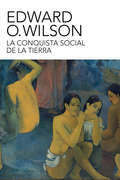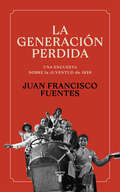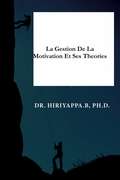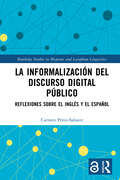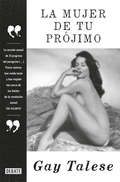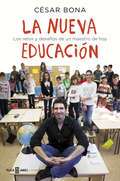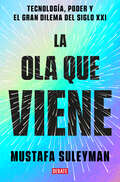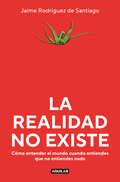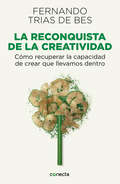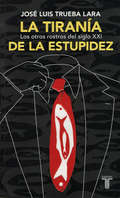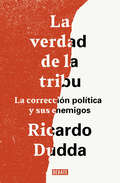- Table View
- List View
La censura horizontal: Un nuevo tribunal digital
by Javier Horacio Contreras Orozco«Javier Contreras ha escrito un libro excepcional y necesario en estos tiempos de tecnologización de la vida pública.» Ignacio Solares Hoy en día las redes sociales son mucho más que simples herramientas de entretenimiento, información y socialización: una parte de nuestras vidas transcurre dentro de ellas. Han ampliado nuestra capacidad de comunicación de forma inaudita, le han dado voz a personas que antes no la tenían y, sobre todo, permiten que la información fluya con una velocidad y en volúmenes sorprendentes. Sin embargo, estas características no han hecho de las redes sociales los espacios de diálogo y tolerancia que esperábamos de ellas. Por el contrario, con frecuencia las hemos visto convertirse en la gran hoguera del siglo xxi. En este libro, Javier Horacio Contreras Orozco analiza las condiciones y procesos que han llevado a las redes sociales a constituirse en un jurado universal que ejerce un nuevo tipo de censura: la poscensura o censura horizontal. A diferencia de la censura tradicional, que provenía de los gobiernos o de poderosos intereses privados, la censura horizontal es un sistema de vigilancia y silenciamiento entre pares. Un tribunal sin juez o, mejor dicho, en el que todos son jueces, pero en el que también todos pueden ocupar el banquillo de los acusados de un momento a otro. Al excluir a una gran cantidad de voces del debate público, la censura horizontal contribuye a la pandemia de desinformación que caracteriza nuestros días. Es uno más, como advierte Contreras Orozco, de los síntomas de la era de la posverdad.
La conquista social de la Tierra
by Edward O. Wilson JOAN- ROS ARAGONESUna obra revolucionaria, la historia de la evolución humana y animal más importante desde El origen de las especies de Darwin, por el más insigne de sus sucesores. ¿De dónde venimos? ¿Qué somos? ¿Adónde vamos? En una obra apasionante que culmina el trabajo de toda una vida, Edward O. Wilson plantea estas tres cuestiones fundamentales y demuestra que la religión, la filosofía y la reflexión no pueden dar respuestas por sí solas, y que la única forma realista de resolver el enigma de nuestra condición humana pasa por la erudición científica. El más insigne sucesor de Darwin rediseña la historia de la evolución y recurre a su vasto conocimiento de la biología y del comportamiento social para revelar cómo la «selección de grupo» puede ser el único modelo que explique el origen del hombre, su dominación y su posterior conquista del planeta. La crítica ha dicho... «Una explicación de gran envergadura acerca del ascenso humano a la dominación de la biosfera, redondeada con extensas reflexiones sobre el arte, la ética, la lengua y la religión.» The New York Times
La educación de los que influyen: ¿Vale la pena estudiar en la Argentina?
by Luciana VazquezUna reflexión acerca de la educación formal en la Argentina a partir deentrevistas a treinta y cinco empresarios, intelectuales, economistas,políticos, hombres de la Iglesia y artistas que contaron sus historiasformativas y respondieron sobre la educación que planean para su hijos. ¿Cómo fue la educación formal de los que influyen y mandan en todo? ¿Estan importante decidir qué tipo de educación recibirán nuestros hijos? ¿Serán los abanderados los líderes del futuro?Éstas son algunas de las preguntas fundamentales que se plantea LucianaVázquez. Después del largo reinado del coeficiente intelectual y laexcelencia académica, después de la hegemonía de la inteligenciaemocional y de la inteligencia social de Daniel Goleman, después deldesembarco del educando-a-los-niños-para-hacer-dinero de Robert Kiyosakiy ahora que la formación en valores parece ganar adeptos, La educaciónde los que influyen se pregunta dónde pusieron el foco aquellos quelograron el reconocimiento público.Parece un libro de entrevistas pero es más bien un ensayo sobre lajusticia y la virtud, sobre el destino y la vocación. La gran preguntaes: ¿Vale la pena estudiar en la Argentina? Y las respuestas queencuentra Luciana Vázquez son tan paradójicas como inesperadas.
La emoción de aprender: Historias inspiradoras de escuela, familia y vida
by César Bona«Un viaje hacia la diversidad, una reflexión sobre el éxito, el fracaso y las expectativas que condicionan a niños, niñas y adolescentes y sobre cómo podemos darles la posibilidad de construir su propio futuro.» ¿Qué es el éxito para ti? ¿Y el fracaso? Y si piensas en niños y niñas, ¿qué responderías? Cuando miras a los que te rodean, ¿consideras que estás libre de prejuicios? ¿Hay ciertas creencias que distorsionan tu manera de ver la vida? Como docentes, muchas cosas no nos las enseñaron en la universidad; como padres, vamos aprendiendo a base de ensayo y error. La empatía es un juego que hay que practicar a diario, y eso no implica alejarse de lo que eres sino acercarse a lo que la otra persona es y siente. En el mundo hay casi 8.000 millones de personas, cada una diferente al resto. Las diferencias son un valor y no un inconveniente. Cuando entendamos eso, comenzaremos a ver la vida de otra manera, con la riqueza que proporciona la diversidad. En este libro hallarás historias inspiradoras que invitan a la reflexión sobre todas esas preguntas y sobre el modo en que miramos a los que nos rodean. «No es lo que miras, es lo que ves», decía Thoreau. Y cada palabra, cada gesto, cuenta. La crítica ha dicho...«César está abriendo nuevos horizontes para los niños. Está creando líderes del futuro, animándolos a tomar las riendas para emprender acciones y cambiar actitudes y prácticas en sus sociedades.»Jane Goodall «Mi primer hallazgo de 2015 ha sido conocer la existencia del profesor César Bona. Es un placer comprobar que, de vez en cuando, aparece un personaje humilde capaz de despertar admiración unánime [...]. Enseña a sus alumnos a disfrutar de la naturaleza y de los animales, ya hacer películas, y a jugar, y a imaginar y a pensar en los demás. También les enseña inglés,historia y matemáticas, pero dice que lo más importanteparaél es que sean buenas personas.»Nativel Preciado, Tiempo.
La escena territorial del desarrollo: Actores, relatos y políticas
by José Arocena Javier Marsiglia<P>Este libro plantea, desde varios puntos de vista, la compleja relación entre territorio y desarrollo. Se propone un recorrido por los relatos que han ido estructurando una manera de pensar el desarrollo, por los actores que viven en el territorio y por las políticas que pueden orientar los procesos de desarrollo territorial. Frecuentemente se ha pensado el desarrollo a partir de fórmulas abstractas, generalizables. <P>Pero eso supone prescindir de la enorme diversidad de la aventura humana al intentar responder a los interrogantes del devenir social, económico, cultural, ambiental. Se olvida así que esos procesos viven en el territorio y que es allí donde encuentran las claves que se necesitan para construir humanidad. Dicho esto, al mismo tiempo es necesario tener en cuenta las tendencias a ignorar el territorio que han existido en los dos últimos siglos. <P>Se ha observado que el desarrollo del capital no se ha detenido en las particularidades de cada región y que ha aplicado las mismas recetas en los lugares más diversos. También la revolución científico-tecnológica de las últimas décadas ha uniformado las manifestaciones socioculturales, volviéndolas lenguajes universales. <P>Es entonces razonable plantearse la pregunta sobre la subsistencia de las particularidades originadas en cada territorio y su influencia en los procesos de desarrollo.Al menos hasta ahora #y quizá aún por mucho tiempo más#, los seres humanos necesitamos construirnos a nosotros mismos en referencia a un lugar determinado. Podrán cambiar las formas como nos referimos a un territorio, pero parece muy difícil que se elimine completamente esa tendencia a darle a nuestro entorno físico un valor central en la construcción de la identidad. Hay una expresión que muestra con claridad esta forma humana de existir, cuando decimos: «este es mi lugar en el mundo».
La felicidad en tus relaciones y el trabajo de constelaciones familiares sistémicas
by Marc Baco José Pedro Galindo MacíasUtiliza este libro de apoyo para aprender: Cómo liberarte y tener una relación satisfactoria Cómo superar los enredos, patrones y bloqueos poco saludables en tu relación de pareja Cómo activar los recursos para tu amor Cómo crecer juntos en una relación, mediante el conocimiento de constelaciones familiares Cómo crear una relación consciente y respetuosa Cómo alimentar tu alma con amor Este libro es para aquellos que desean alcanzar la felicidad en una relación de amor. Está dirigido a los clientes y a los facilitadores de constelaciones familiares sistémicas. Aunque no reemplaza la participación activa en una constelación familiar sistémica, sí ayuda a prepararse para ella. Los ejemplos de sesiones de constelación incluyen ejercicios que puedes hacer en casa. Aprende de otros que han tenido éxito a través de constelaciones familiares sistémicas, a nutrir las relaciones de amor, de manera que fluyan, crezcan y prosperen.
La filosofía de ser niños
by Christopher PhillipsCómo liberar la creatividad, la curiosidad y la razón a través de la sabiduría de los más jóvenes. La niñez es nuestra plataforma de despegue, el periodo de la vida en el que el aprendizaje es más intenso, y adquirimos el conocimiento crítico y las habilidades que nos permitirán adaptarnos. Filósofos de todas las épocas han señalado que, con el paso del tiempo, los seres humanos tendemos a encogernos mental y emocionalmente. Desvirtuamos nuestra naturaleza -caracterizada por la curiosidad, la empatía, la razón, el asombro y el deseo de experimentar y entender- y, de esta manera, se va volviendo borroso nuestro sentido de identidad. Comenzamos nuestras vidas con un estallido moral, intelectual y creativo. Siguiendo las evidencias científicas que así lo demuestran, Christopher Phillips advierte que la niñez no es simplemente un estado de desarrollo, de transformación -de llegar a ser-, ni la adultez un momento de plenitud o acabamiento. Si aprovechamos las cualidades propias de la niñez, no estaremos condenados a volvernos seres desanimados y frágiles, sino que creceremos y viviremos guiados por el asombro, la curiosidad, la imaginación, el sentido de juego y la compasión. Explorando y explotando la filosofía de ser niños, podremos desarrollar ilimitadamente nuestro potencial. Vinculando filosofía, ciencias sociales, investigación neurocientífica y anécdotas personales, este libro propone una aproximación radicalmente distinta al tema de la frontera entre niñez y adultez, para mostrarnos que la forma como los niños ven y viven el mundo puede ser una clave para un desarrollo pleno, para alcanzar eso que los griegos llamaban areté o excelencia.
La generación perdida: La juventud de 1929
by Juan Francisco Fuentes¿Qué pensaban los jóvenes en 1929? Un emocionante panorama espiritual de la España de los años veinte. «De nuestro tiempo me agrada todo, por eso si me hubieran pedido mi opinión no habría deseado nacer en ninguna época anterior».Corina, estudiante de Derecho y funcionaria ¿Será verdad que toda generación es una generación perdida? Así lo sugiere el autor de este libro, el historiador y catedrático JuanFrancisco Fuentes, al hacer balance de la vida de aquellos jóvenes que en 1929 respondieron a una encuesta del periódico El Sol sobre la juventud española. Sus testimonios sobre la política, el amor, la cultura o el papel de la mujer en la sociedad componen una visión de la vida rebosante de optimismo, expresada con una libertad sorprendente en plena dictadura de Primo de Rivera. Perola reconstrucción de la trayectoria posterior de muchos de estos jóvenes muestra un destino trágico, marcado por la Guerra Civil y sus secuelas, que contrasta con su fe en el futuro unos pocos años antes. La generación perdida tiene algo de El mundo de ayer, el libro autobiográfico de Stefan Zweig. A «la edad de oro de la seguridad», como describe Zweig el periodo anterior a la Gran Guerra, le corresponde la España de los felices veinte, convencida, sobre todo los más jóvenes, de vivir el inicio de una etapa de progreso y libertad sin precedentes. Fue la «generación del cine y los deportes», como dice uno de sus miembros, pero también la de aquellos que lucharon entre sí a partir de 1936. El lector encontrará en estas páginas una imagen emocionante y dramática de la España que pudo ser y no fue.
La gestion de la motivation et ses théories
by Hiriyappa BL’administration, les employés, les consommateurs et les clients sont aujourd’hui l’atout le plus important de toute entreprise. Dans le secteur des affaires concurrentiel d’aujourd’hui, la motivation joue un rôle important dans l’enrichissement de la satisfaction et de la rétention des employés et se focalise sur la meilleure façon de motiver les employés dans l’intérêt d’une organisation. La gestion de la motivation identifie le contexte théorique, y compris la motivation, les déterminants, les concepts du travail, le système de récompenses efficace et les théories qui peuvent améliorer les politiques de l’administration, afin de motiver les employés à se servir de leur plein potentiel. Ce livre est spécialement conçu pour les étudiants en psychologie, études commerciales, master en administration des affaires, les diplômés de troisième cycle en administration et cadres, enseignants, parents, entraîneurs, employeurs et amis, ainsi que pour un public plus large intéressé à promouvoir une motivation et des performances optimales, comme : les gestions informatiques, hommes d’affaires, entrepreneurs, directeurs d’exploitation, cadres intermédiaires à travers la consultation sur la gestion, dirigeants d’entreprise et professionnels tels que directeur des prévisions et de la planification, directeur des prévisions, directeur de la planification stratégique, directeur du markéting, directeur des ventes, directeur de la publicité, directeur financier, responsable financier, contrôleur, trésorier, analyste financier, directeur de production, chef de marque/produit, nouveau chef de produit, responsable de la chaîne d’approvisionnement, responsable de la logistique, responsable de la gestion du matériel, agent d’approvisionnement, responsable de la planification, et directeur des systèmes d’information.
La idea de la justicia
by Jean DrèzeUna nueva teoría de la justicia para el mundo real. ¿Es la justicia social un ideal fuera de nuestro alcance o una posibilidad real? Más allá del discurso intelectual, la idea de la justicia desempeña un importante papel en nuestras vidas. Amartya Sen ofrece una alternativa a las teorías convencionales de la justicia, que a pesar de sus muchos logros hace tiempo que dejaron atrás las realidades prácticas. Desde la Ilustración, las teorías dominantes han tendido a ocuparse de identificar las disposiciones sociales perfectamente justas y definir la naturaleza de la sociedad perfecta. Sen, entregado a la reducción de la injusticia, centra su enfoque en los juicios comparativos de lo que es «más» o «menos» justo y en evaluar los méritos de ciertas instituciones e interacciones sociales. En el núcleo de su reflexión subyace el respeto por las diferentes percepciones de la «sociedad justa». Muy distintas convicciones puedenofrecer soluciones claras, directas y defendibles. La perspectiva de Sen, uno de los pensadores más influyentes de nuestra era, hace uso de esa pluralidad con el fin de construir una teoría de la justicia para el mundo moderno, capaz de absorber distintos puntos de vista y resolver las cuestiones de injusticia global. La crítica ha dicho...«Sen es uno de los grandes pensadores de nuestra era.»The Times «Leer Las razones de la justicia es como asistir a una clase magistral de razonamiento práctico. [...] Ésta es una obra monumental.»The Independent
La informalización del discurso digital público: Reflexiones sobre el inglés y el español (Routledge Studies in Hispanic and Lusophone Linguistics)
by Carmen Pérez-SabaterLa informalización del discurso digital público is an innovative volume which examines different communicative practices which take place on social media and justifies the shift towards more informal/oral styles of public communication in English and Spanish.The book takes a first step in understanding and analysing how the use of code-switching, language preference, and graphicons contribute to the public image of institutions, politicians and celebrities, as well as how the aforementioned strategies fit into the negotiation of the norms and identities of public communities on social media platforms. Offering an updated approach to studying digital discourse in public contexts, it is the first of its kind written in Spanish. The volume focuses on the characteristic linguistic features associated with digital communication and informal oral writing styles, such as reduplication of vowels, consonants, acronyms, and shortenings, code-switching and language preference, and the insertion of multimodal and graphical elements.A comprehensive and unique volume, La informalización del discurso digital público is ideal for researchers and postgraduate students interested in digital discourse, sociolinguistics, and media studies.Chapter 5 of this book is freely available as a downloadable Open Access PDF at http://www.taylorfrancis.com under a Creative Commons Attribution-Non Commercial-No Derivatives (CC-BY-NC-ND) 4.0 license.La informalización del discurso digital público es un volumen innovador que examina diferentes prácticas comunicativas que tienen lugar en las redes sociales con el fin de justificar el cambio hacia estilos más informales/orales de comunicación pública en inglés y en español.El libro ofrece un punto de vista novedoso sobre la contribución del cambio de código, la elección de lengua y los graficonos a la imagen pública de instituciones, políticos y celebridades; así como la repercusión que las estrategias mencionadas tienen en la negociación de las normas e identidades de las comunidades públicas en redes sociales. Ofrece un enfoque actualizado del estudio del discurso digital en contextos públicos y es el primero de este tipo escrito en español. El volumen se centra en los rasgos lingüísticos característicos de la comunicación digital y de los estilos de escritura oral informal, tales como la reduplicación de vocales, consonantes, acrónimos y abreviaturas, el cambio de código y la preferencia de lengua, así como la inserción de elementos multimodales y gráficos.La informalización del discurso digital público es un volumen completo y único, ideal para investigadores y estudiantes de posgrado interesados en el discurso digital, la sociolingüística y los estudios sobre los medios de comunicación.Chapter 5 of this book is freely available as a downloadable Open Access PDF at http://www.taylorfrancis.com under a Creative Commons Attribution-Non Commercial-No Derivatives (CC-BY-NC-ND) 4.0 license.
La laisse du tigre: F(r)ictions humanimales en Amérique du Nord (21e – Société, histoire et cultures)
by Professeur David JaclinUn tigre du Bengale, qui barbote anxieusement dans une petite piscine en plastique durant l’été et que l’on nourrit de viande de supermarché, est-il toujours un tigre? En examinant l’existence troublée d’animaux réputés sauvages, mais vivant désormais de conditions domestiques et artificielles puissantes, ce livre pose la double question de la communication et de l’animalité.La vie accidentée de ces animaux trafiqués transpire nos changements écologiques actuels, incarne la disparition vertigineuse d’espèces animales et renvoie à la détérioration accélérée d’habitats naturels. Dans ce livre, on découvre des biographies animales, comme celle d’un chimpanzé cobaye (Rachel) évoluant dans un sanctuaire évangélisateur ou encore, celle d’un dauphin (Nellie) au « chômage », mis aux enchères après la faillite du parc d’attraction qui l’a vu naître et grandir. Mises en résonance, chacune de ces biographies compose un véritable bestiaire d’êtres qui pourraient sembler provenir d’histoires fictives abracadabrantesques et qui, pourtant, sont tout sauf imaginaires. Voilà qui permet de reposer, autrement, la vieille question de l’espèce.Publié en français
La libertad del compromiso: Cambiar tu vida para cambiar el mundo
by Hernán Zin¿Es posible cambiar el mundo? En una sociedad globalizada ¿es posible ayudar a los más pobres y paliar las desigualdades sociales? A estas preguntas responde este libro aportando para ello la experiencia humana, personal y vital de siete personas: José María en África; Belén en Filipinas; Fabiola en el Tibet; Alan en Argentina; Urmi, Alison y David en la India. Todos ellos dejaron sus respectivos países y vidas acomodadas para ayudar a los demás, a los más pobres, al margen de las grandes organizaciones, con proyectos personales y modestos. Y además de ayudar, resulta que son más felices y se sienten útiles. Aquí nos enseñan cómo afrontar la vida de otra manera, contagiándonos de su coraje, mostrándonos las posibilidades que todos tenemos de "comprometernos". Nos demuestran, en fin, que es posible salirse de una rueda que, como dice Rosa Regàs en la última parte del libro, te convierte en un hombre mutilado «y un día te encuentrasbajo un cielo estrellado y eres incapaz de verlo». Reflexión a la que se incorporan voces relevantes de nuestra sociedad como Fernando Savater, Ramiro Calle, Concha García-Campoy, Pilar Bardem, Javier García Sánchez, Carlos Taibo y Dominique Lapierre. Análisis y testimonio se unen en un libro escrito para no dejar indiferente a nadie. Un libro para todos aquellos que se sienten comprometidos y que enarbolan la bandera de la libertad. Porque, como dice Fernando Savater en su texto, «las personas libres no se preguntan qué va a pasar sino qué van a hacer».
La libertad tiene un precio: Conversaciones
by César Vidal Federico Jiménez LosantosEl libro más personal de las dos voces más polémicas de la actualidad. Huyendo de lugares comunes y al margen de cualquier moda o ideología imperante, Federico Jiménez Losantos y César Vidal conversan sin casarse con nadie acerca de lo divino y de lo humano, y analizan los problemas de España, el nacionalismo, el terrorismo y el proceso de paz, el futuro de la prensa, la erosión de instituciones como la Iglesia católica y la monarquía, el 15-M y los indignados y profundizan en los orígenes de la peor crisis económica de las últimas décadas. Un diálogo sin pelos en la lengua en el que, además de diseccionar sin anestesia el mundo actual, mostrarán por primera vez su lado más cercano a través de historias sobre su infancia y formación, y de su experiencia en torno al amor, la amistad, la felicidad y la libertad. Una conversación a corazón abierto, íntima y políticamente incorrecta.
La mujer de tu prójimo
by Gay TaleseLa polémica obra maestra del escritor y periodista Gay Talese sobre las costumbres sexuales en Estados Unidos, en una edición revisada y actualizada. La publicación en 1981 de La mujer de tu prójimo revolucionó la percepción de las costumbres sexuales de los estadounidenses y, por extensión, de Occidente. El ya clásico reportaje de Gay Talese aborda uno de los grandes temas de nuestro tiempo de forma magistral, sorprendente y reveladora. Talese se embarcó en una excepcional investigación de la revolución sexual del siglo XX, en la que podemos oír las voces de sus grandes protagonistas: desde partidarios de la censura y ciudadanos escandalizados, pasando por los propietarios de salones de masajes, hasta el fundador de la revista Playboy, Hugh Hefner. Historias de primera mano en las que el autor compromete su intimidad en más de una ocasión con el fin de explotar el cambiante paisaje sexual y moral en los años posteriores a la revolución de los años setenta. Fascinante y polémico, La mujer de tu prójimo cambió la manera en que nos veíamos a nosotros mismo y a los demás. Reseñas:«Su especial talento reside en haber sabido hacer periodismo de todo aquello de lo que suelen huir los otros reporteros: del hombre común, del desconocido, del perdedor o de los que están lejos de los focos y el éxito y, a través de ellos, ofrecer un retrato fidedigno del ser humano y de sus obsesiones.»Bárbara Celis, Babelia «Leer a Talese es darse cuenta de que el nuevo periodismo es el más viejo, el de siempre, el que nunca morirá.»Qué Leer
La nueva educación: Los retos y desafíos de un maestro de hoy
by César Bona¿Por qué ya no son tan importantes los libros de texto? ¿Por qué hay que relativizar la importancia de los deberes? ¿Por qué se debe educar en empatía? ¿Por qué la educación debe estar por encima de todos los gobiernos? La nueva educación es el testimonio sincero y valioso de un maestro de hoy. «Cada niño es un universo. Todos los niños son extraordinarios y no basta con llenarles la cabeza de datos, sino que hay que facilitarles herramientas como conocimiento, empatía, sensibilidad y resiliencia para que puedan salir fortalecidos de las situaciones adversas. Deben saber que si se proponen algo y luchan por ello, pueden conseguirlo, y que de ellos depende que el mundo sea un lugar mejor.»César Bona César Bona, uno de los cincuenta mejores maestros del mundo según el Global Teacher Prize, el llamado Premio Nobel de los profesores, nos aclara en este libro que ser maestro no es acomodar a los alumnos a unos planes de estudio: todo educador debe adaptarse al motor imparable y entusiasmado de un niño. Hay que motivarles, estimular su creatividad y aguijonear su curiosidad; porque los niños no son solo los adultos del mañana: son habitantes del presente. En primera persona, César Bona relata anécdotas, nos cuenta los momentos clave en su vida que le convirtieron en el maestro que es en la actualidad, y nos muestra que la metodología de enseñanza más efectiva es implicarse con los alumnos. Porque el educador es un ser privilegiado, que puede impartir y compartir sus conocimientos en tribu. Porque otra educación es posible. La crítica ha dicho...«César está abriendo nuevos horizontes para los niños. Está creando líderes del futuro, animándoles a tomar las riendas para emprender acciones y cambiar actitudes -y prácticas- en sus sociedades.»Jane Goodall «Enseña a sus alumnos a disfrutar de la naturaleza y de los animales, hacer películas, jugar, imaginar y pensar en los demás. También les enseña inglés, historia y matemáticas, pero lo más importante para él es que sean buenas personas.»Nativel Preciado, Tiempo
La ola que viene: Tecnología, poder y el gran dilema del siglo XXI
by Michael Bhaskar Mustafa SuleymanESTAMOS A TIEMPO DE SALVAR EL MUNDO. ESTE LIBRO ES UNA LLAMADA DE ATENCIÓN SOBRE LOS DESCOMUNALES RIESGOS DE LA INTELIGENCIA ARTIFICIAL. «Fascinante, muy bien escrito, importante».Yuval Noah Harari «Una lectura esencial».Stephen Fry Estamos a punto de cruzar un umbral crítico en la historia de nuestra especie. Todo lo que conocemos va a cambiar.Pronto viviremos rodeados de una inteligencia artificial responsable de ejecutar tareas complejas: desde gestionar negocios y producir contenido digital ilimitado hasta dirigir servicios públicos fundamentales o mantener infraestructuras. Habitaremos un mundo de impresoras de ADN y ordenadores cuánticos, patógenos artificiales y armas autónomas, robots asistentes y energía abundante. Todo esto supone una transformación radical en la capacidad humana.No estamos preparados. Como cofundador de la empresa pionera DeepMind, Mustafa Suleyman ha estado en el epicentro de esta revolución llamada a convertirse en el mayor acelerador del progreso de la historia. Asegura que la próxima década estará marcada por esta gran ola de nuevas y poderosas innovaciones de rápida proliferación. Impulsadas por abrumadores incentivos estratégicos y comerciales, estas herramientas ayudarán a afrontar nuestros retos globales y crearán una enorme riqueza, pero también provocarán revueltas a una escala antes inimaginable. En La ola que viene, Suleyman (uno de los mayores expertos del planeta en sistemas inteligentes) demuestra cómo estas fuerzas amenazan seriamente las bases del orden mundial. Mientras nuestros frágiles gobiernos caminan sonámbulos hacia el desastre, nos enfrentamos a un dilema existencial: por un lado, enfrentarnos a los daños sin precedentes derivados de una exposición incontrolada a estas nuevas tecnologías; por otro, a la amenaza de una vigilancia tiránica y abusiva. ¿Conseguiremos abrir un estrecho punto de fuga entre la catástrofe y la distopía? La crítica ha dicho:«Este importante libro es un vívido toque de atención. En él se esbozan cuidadosamente las amenazas y oportunidades asociadas a los estimulantes avances científicos de los últimos años. La ola que viene está repleto de datos interesantes, argumentos fascinantes y observaciones convincentes; es una lectura esencial». Daniel Kahneman, Premio Nobel«El conocimiento de Mustafa Suleyman como tecnólogo, empresario y visionario es esencial... A través de una profunda y muy relevante investigación, este libro ofrece una visiónapasionante de algunos de los retos más importantes de nuestro tiempo». Al Gore, exvicepresidente de Estados Unidos «La revolución de la inteligencia artificial ya está en marcha, pero ¿la conocemos bien? La ola que viene presenta una guía erudita y lúcida tanto de lahistoria del cambio radical que ha supuesto la tecnología como de los profundos retos políticos que nos aguardan». Anne Applebaum «Este libro es inspirador y aterrador al mismo tiempo. Es una lección urgente para quienes no entienden las revoluciones tecnológicas que estamos viviendo y un desafío frontalpara quienes sí las comprenden. Este libro trata del futuro de la humanidad: tenemos que leerlo y actuar en consecuencia». David Miliband, exministro de Asuntos Exteriores del Reino Unido
La promesa de las Lilas: Una historia inspiradora de coraje y empoderamiento
by Leah Almario-RiveraEPILOGO De vez en cuando, mis amigos y familia me conectan con alguien que tiene un miembro de la familia diagnosticado con autismo, en caso de que pueda darles una mano u ofrecerles consejos. “¿Qué sugieres que haga? ¿Tienes algunas pautas?” Mi corazón se va con esa familia. ¿Cómo puedo ayudar cuando estoy a miles de kilómetros de ellos? En otros casos me han preguntado, “¿Por qué no trabajas directamente con niños con autismo ya que se beneficiarán de tu conocimiento?” Ojalá pudiera. Especialmente en América del Norte, las familias solo tratan con profesionales certificados en la materia. Mi conocimiento se limita a mi experiencia personal. En la reunión de atletismo del año pasado, un padre que conocía a Gordon desde el jardín de niños vino hacia mí. “¡Mira a tu hijo! Ha pasado por un largo camino.” Le sonreí, y mientras miraba a Gordon de reojo sonreí con mucho orgullo y asentí. Sí, estoy orgullosa de él. “Deberías escribir un libro.” Sugirió el padre. “¿Por qué?” Fruncí el ceño reaccionando a su sugerencia. “Gordon no es un prodigio ni ha desarrollado habilidades extraordinarias atribuidas popularmente a gente con autismo.” “Se han escrito muchas historias sobre éstas personas asombrosas. Pero el universo también está interesado en la historia de Gordon.” Agregó. Reflexioné ante la idea. Es cierto. Mi hijo tal vez no tenga habilidades increíbles, pero su historia puede servir de inspiración. Nunca había pensado en escribir nuestro viaje. Al pasar los años, la incidencia del autismo ha crecido. Cada vez que menciono ‘autismo’, el extraño con el que estoy hablando inmediatamente compartirá su historia sobre alguien que conoce que también está en el espectro (desorden del espectro autista) y se podría beneficiar de mis consejos e historia. Mientras tanto y afortunadamente, una gran dive
La psicología del dinero: Por qué ejerce tal poder y cómo dominarlo
by Claudia HammondLa psicología del dinero, de Claudia Hammond, es un examen científico de nuestra relación con el dinero, un estudio detallado del poder que éste ejerce sobre nosotros. Sabemos que lo necesitamos, y tendemos a querer más, sin tener en cuenta el modo en que afecta a nuestra mente, a nuestras emociones y a nuestro comportamiento. La actitud de cada uno de nosotros respecto a la deuda y el gasto es tan única e inevitable como una huella digital. Existen muchos libros sobre qué debemos hacer con el dinero, pero lo que analiza Claudia Hammond en este sorprendente y polémico libro repleto de anécdotas y ejemplos, es lo que el dinero nos hace a nosotros, al tiempo que nos muestra las extraordinarias herramientas que la psicología proporciona a la hora de tomar mejores decisiones monetarias. Reseñas:«Una fascinante investigación sobre el modo en que el dinero juega con nuestras mentes, y una útil guía para evitar que nos estafen -ya sean los demás o nuestra propia mente irracional.»Oliver Bukerman, The Guardian «En parte fascinante exploración psicológica, en parte guía práctica, el libro muestra las múltiples formas en que el dinero juega con nuestras mentes y los medios para manejarlo.»Telegraph «Fascinante y perspicaz... Hammond domina toda una batería de experimentos psicológicos que nos muestran cómo gastar (y ahorrar) más sabiamente.»Sunday Times
La realidad no existe: Cómo entender el mundo cuando entiendes que no entiendes nada
by Jaime Rodríguez de SantiagoEl primer libro del creador del exitoso pódcast Kaizen. ¿Cuánto confías en lo que ves, sientes, piensas o recuerdas? ¿Y si fuera todo mentira? En este libro aprenderás que tu universo no es igual que el de tu perro ni que el del camarón mantis púrpura, que no ves el mar del mismo color que los griegos del siglo vii a.C., que tu pueblo es uno de los rincones más exóticos que existen, aunque no lo creas, o que puedes llegar a recordar cosas horribles que nunca sucedieron. Y es que la realidad en la que vivimos es muy frágil. Nos engañan los sentidos, el cerebro y la cultura; nos engañan hasta las leyes de la física. Pero, a pesar del vértigo que puede generarnos pensarlo, ser conscientes de nuestros filtros y nuestra percepción limitada de las cosas es el primer paso para empezar a entenderlas de verdad. Tras desarrollar BlaBlaCar en España y mientras dirige FreeNow en el sur y oeste de Europa, a Jaime Rodríguez de Santiago le ha dado tiempo de convertirse en un gran divulgador con su exitoso pódcast Kaizen. En estas páginas nos brinda la oportunidad de abrir nuestro foco y descubrir nuevos matices en todo lo que nos rodea, desmontando nuestras aparentes certezas y aportando herramientas y habilidades para construir nuestro mundo con una mirada distinta. Este libro cuenta que...•«Hay muchas cosas que existen, pero no forman parte de nuestra realidad y, a la vez, hay otras muchas que forman parte de nuestra realidad, pero no existen». •«Construimos nuestras explicaciones simplificando la realidad». •«Hay un conjunto de mecanismos psicológicos que nos empujan a no cambiar de opinión, hasta el punto de hacernos manipulables o, incluso, de reescribir nuestros recuerdos».•«La historia de la humanidad es la de una eterna búsqueda de sentido en la que tratamos de explicarnos las reglas del juego. Curiosamente, con cada paso que hemos dado, nos hemos alejado más y más de lo que al principio nos parecía obvio». •«Nos movemos por la vida tomando decisiones y actuando en virtud de lo que sabemos y, como mucho, con un ojo puesto en aquello de lo que somos conscientes que desconocemos. Pero hay una inmensidad que nos es tan completamente ajena que ni siquiera somos conscientes de que existe».
La reconquista de la creatividad: Cómo recuperar la capacidad de crear que llevamos dentro
by Fernando Trias de BesLa creatividad no tiene final, no conoce más límite que el que la propia vida le imponga. Cuando se acabe la vida, la creatividad lo hará con ella. Mientras haya vida, la creatividad permanecerá. Y eso, como seres vivos e inteligentes que somos, es una gran noticia.Fernando Trías de BesLa creatividad es una facultad innata a la condición humana. Este es el punto de partida de la reflexión de Fernando Trías de Bes en La reconquista de la creatividad. El acto de crear es consustancial a nuestra existencia. Sin embargo, a medida que nuestras vidas avanzan vamos progresivamente perdiendo el impulso de esta facultad. El miedo al error, el imperio de la lógica, el sistema educativo o los protocolos y rutinas producen individuos eficientes y adaptados pero se convierten en algunas de las circunstancias que van limitando de forma progresiva nuestra capacidad de crear. La buena noticia es que la facultad creativa permanece latente en nuestro interior y es recuperable. Fernando Trías de Bes nos ofrece una serie de herramientas prácticas para reconquistar nuestra capacidad de crear, tanto a través de la identificación y erradicación de los obstáculos e inhibidores del proceso creativo como de una serie de potenciadores de la creatividad.
La revuelta de las putas
by Amelia TiganusAmelia Tiganus es un referente en su activismo y se ha convertido en una voz fundamental del movimiento feminista en España, así como entre quienes construyen una teoría abolicionista de la prostitución. A raíz de su experiencia personal y de su manera de entender y practicar la militancia, nos transmite la importancia de entender por qué «lo personal es político» y nos carga de razones para luchar por un mundo más justo, igualitario y sin prostitución, para las mujeres y las niñas. «comprendí que mi historia personal era una cuestión profundamente política, era la historia de las mujeres que el patriarcado pone a disposición de los hombres como mujeres públicas […]. Las abolicionistas nos exponemos mucho al enfrentarnos a una perversa, mafiosa, poderosa y dañina industria millonaria, que pretende que nuestro destino sea servir sexualmente a los hombres. Es una batalla larga y dura, pero será un orgullo saber que hemos formado parte de un movimiento noble y justo, que ha dejado como legado, para las que quizá aún no han nacido, un mundo sin prostitución […]. Hagamos la «revuelta de las putas». Por las niñas de hoy y las mujeres de mañana.»
La seducción de las palabras
by Álex GrijelmoUn recorrido por las manipulaciones del pensamiento. Según qué palabras utilicemos así formaremos nuestro pensamiento. Desde la política, la publicidad, hasta el amor y la literatura, muchos intentan dominar los mecanismos de seducción verbal para así manipular el pensamiento ajeno. <P><P> Esta obra analiza con innumerables ejemplos cómo se manipulan hoy en día los vocablos para alterar la percepción que tenemos de la realidad, cómo se emplea su fuerza o su sutileza para engatusar a los demás.
La tiranía de la estupidez: Los otros rostros del siglo XXI
by José Luis Trueba LaraLos otros rostros del siglo XXI ¿Es justificable la fascinación que ejerce la democracia sobre el hombre moderno? ¿Es preferible a los regímenes totalitarios? ¿La economía de mercado libre es el mejor camino para salvaguardar la paz? Aún más, ¿quién podría despedir a alguien que viste un Armani? José Luis Trueba Lara responde un no o un nadie rotundos a estas preguntas luego de examinar con profundo desencanto la cultura occidental en el cambio de siglo: el culto al dinero; la democracia que se transformó en una religión política; la homogeneización de la sociedad por las marcas; la sacralización de las empresas; la nueva televisión que hace de los talk shows y reality shows escaparates sádicos de la miseria humana; el culto irresponsable de la felicidad que fomenta el vivir una infancia perpetua, el cuerpo esclavizado por el trabajo y la moda, y -por supuesto- la imposibilidad del amor en un mundo desarraigado y sin esperanza.
La verdad de la tribu: La corrección política y sus enemigos
by Ricardo DuddaUn recorrido histórico y social sobre la corrección política y sus enemigos. ¿Qué es exactamente la corrección política? En este libro Ricardo Dudda intenta comprender por qué la corrección política protagoniza innumerables debates, además de convertirse en la obsesión de los movimientos populistas. Para el autor, el concepto ampliamente manipulado se ha transformado en un arma de doble filo en las guerras culturales contemporáneas: no solo define una actitud sino también una forma de control de la opinión pública. Es, en definitiva, un fenómeno que tiene que ver con el civismo y el respeto a las minorías, pero que se alimenta de eufemismos y vacua retórica. Al reflexionar sobre la izquierda identitaria o políticamente correcta, incapaz de ofrecer un relato atractivo para los votantes desencantados, Dudda nos plantea una serie de preguntas difíciles de responder. ¿Es la corrección política una de las causas de la victoria de Trump o el Brexit? ¿Es la izquierda contemporánea, con su discurso sobre el cosmopolitismo y la diversidad, responsable del auge y triunfo de la ultraderecha en Occidente? Fresco y provocador, La verdad de la tribu nos ofrece un análisis que se postula como una defensa del cosmopolitismo, el pluralismo y la tolerancia, y de la Política como única herramienta para fomentar la convivencia.

